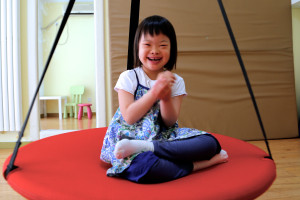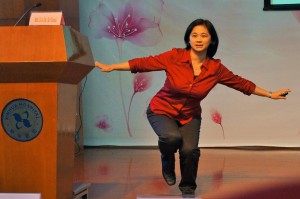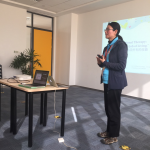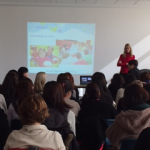Tiffany is an American Learning Support Specialist at LIH Olivia’s Place Beijing. She graduated from Widener University with dual certified in Elementary Education and Special Education in 2013. She has been teaching Pre-Kindergarten to 5th Grade Students for 6 years. She has 4 years of experience working with students with special needs, including students with severe disabilities and behavioral disorders. Tiffany has training in Applied Behavioral Analysis and is knowledgeable about autism spectrum disorders, as well as interventions, tools, assessments, and strategies to accommodate students with a range of abilities. She has experience modifying lessons to create ideal learning opportunities for each student to help them succeed. Tiffany speaks English.
How long have you been in China?
I have been in China for a little over 2 years.
Why did you choose to work at LIH Olivia’s Place?
Being licensed in Special Education in China is tough. The awareness and acceptance for students with disabilities is so low that you encounter students who you know need help not get it due to the stigma or lack of knowledge about it. When I found out about LIH Olivia’s place I knew I had to be a part of it. Finally, I thought, there is a place that is spreading the word, a place that is facilitating getting so many students the help, interventions, and tools they need to become successful. I was excited to hear about the upcoming programs and to be able to give input as someone who is on the front-lines in the classroom.
Why did you choose your field?
I knew I wanted to teach after I had one of the best fourth grade teachers. She told me I could do anything, be anything, and gave me hope when the surrounding environment was close to bleak and not so promising. I knew that I wanted to be able to do that for others, to give hope through the value of education. Showing students that being willing to learn about the world and themselves could take them so many places and is a wonderful gift. In regard to special education I fell into the field accidentally and those unique students took hold of my heart. I yearned to learn more about how to help those students be successful in any type of environment regardless of level of ability. I enjoy it and the opportunity it gives me to continue to learn and grow as a professional.
What are some of the most rewarding experiences you have had in your profession?
As a teacher I am lucky to have many extremely rewarding experiences. Every time I see a struggling student pass a test, or when I have a high achiever get accepted to a tough program, but I can recall one that will always stay with me. I worked at an educational institution for students with severe behavioral and physical disabilities. I often took the students on trips in the community and the ratio was 2:1 or 1:1. I was assigned to two 20-year-old young men. They were the epitome of perseverance. They were both classified as dangerous and could severely hurt me if over stimulated or stressed. They never once showed aggression toward me so I asked to always be assigned to them for outings. One day I took them to the store to work through an “Activity of Daily Living goal,” they had to find items on a list. In one of the aisles one of the young men got very excited by a Disney character on a box; he began jumping, clapping, and yelling loudly, which were usually signs of behavior before he would become overstimulated and aggressive. Some of the patrons of the store looked worriedly our way and wanted to get help as my student was very tall and pretty stocky. I began jumping with him as I knew how much he enjoyed Disney characters and hoped to keep the store from calling others to the aisle, which would have negatively impacted him. I told him that if he completed his goal properly I would get the item with the Disney character for him as a gift; he calmed down and hugged me and picked me up while hugging me. We finished his goal and walked to the counter. The cashier pulled me aside and told me that it was the most amazing thing she has seen. She said that before that point if she would have seen a person like my student she would have stared and walked away quickly but after seeing how I interacted with him and how he is just another person who likes what he likes, she now has an actual experience to refer to rather than an assumption. My students and I thanked her and gave her high fives. I took pride in know that he changed her perception; not someone telling her what she should think but rather getting the opportunity to see it firsthand. I think it is our job as educators to give our students a chance to prove themselves, think for themselves, and discover their own potential, teaching them to become their own mouthpiece while showing them the path so they can facilitate their own success.
What’s your favorite thing about living in China and working at LIH Olivia’s Place?
My favorite thing about working in China is the opportunity to expose more and more people to an African American educator as well as continue to open the minds of so many people who are not aware of the helpfulness and benefits of Special Education and intervention. I hope to contribute toward removing its stigma and getting more people help in an open and accepting environment. In the area I live in Beijing, I have seen no other African Americans. My students have never encountered someone like me nor have their parents. I have been able to educate them about my ethnicity and let them know that I am an educated individual who is here to provide a quality education for their children. It has been a challenge to overcome some of the misconceptions and racism but it pushes me to become better and shows me that what I am doing is very necessary.
What would you like to be doing in 5 years’ time?
In 5 years I hope to be finished with my master’s degree and maybe start a family. I hope to take my experiences through traveling in Asia and maybe elsewhere to the United States to begin exposing American students to the world around them which is also so needed.















